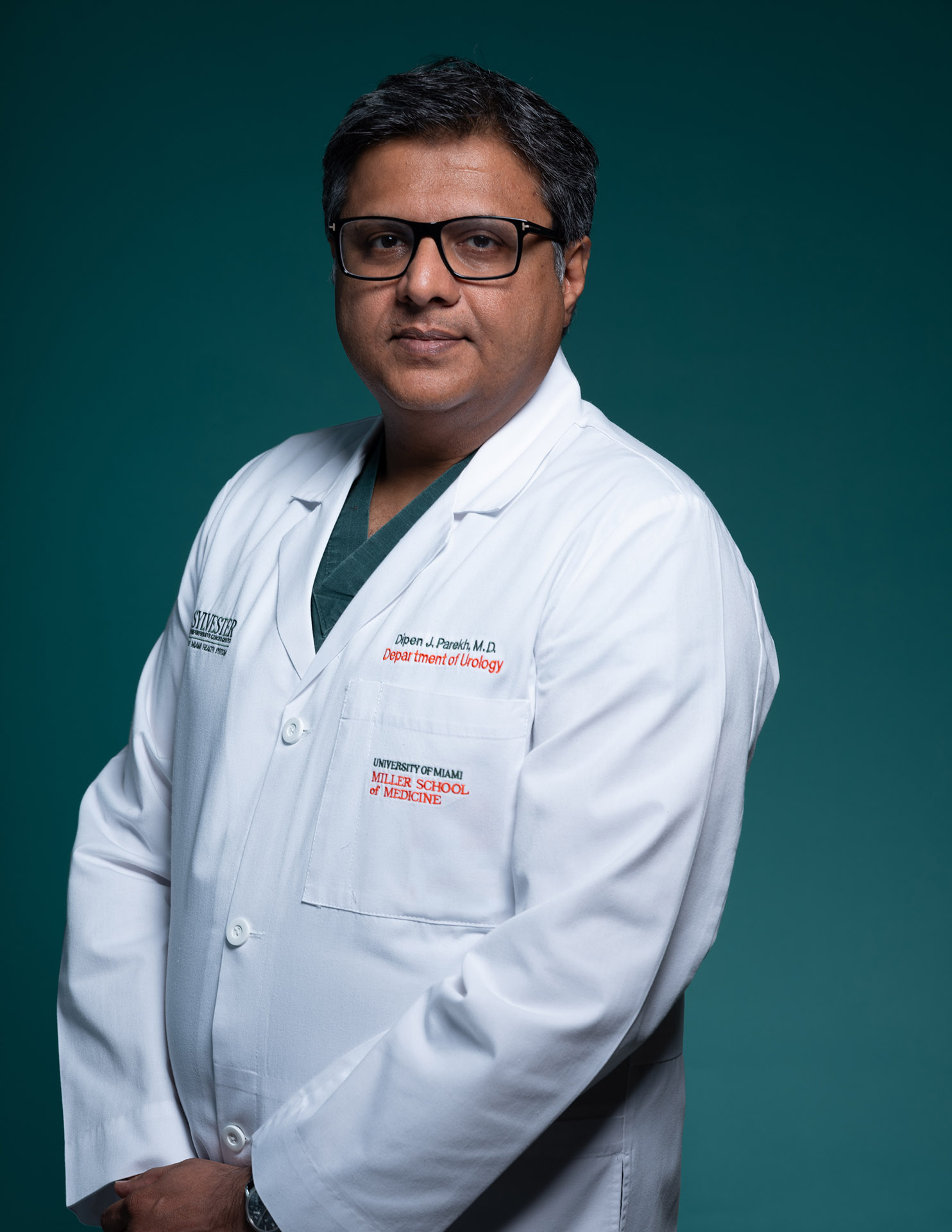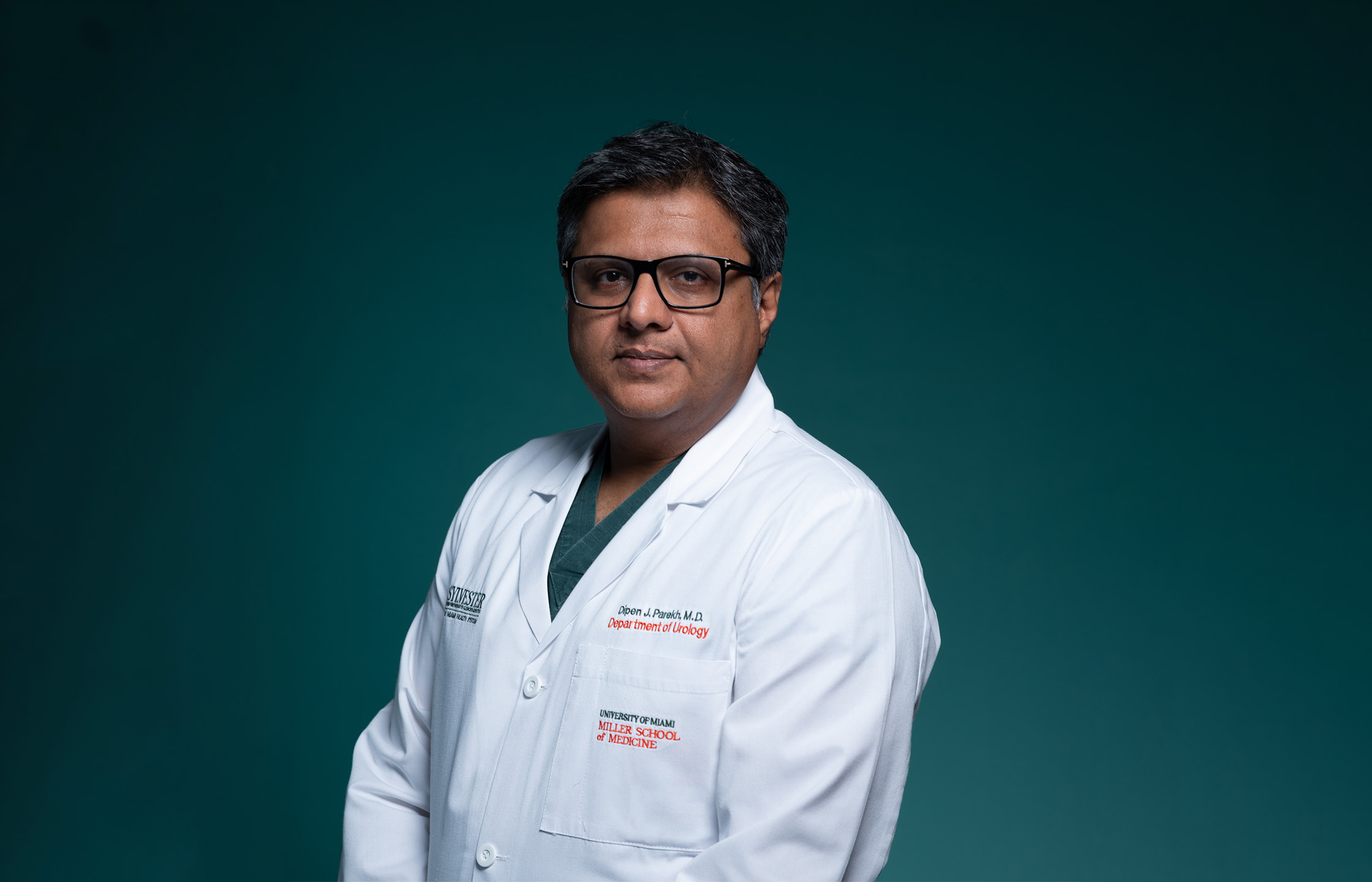Dr. Dipen J. Parekh
The founding director of the Desai Sethi Urology Institute shares his vision for building a multidisciplinary center that is a global leader in urology
By Ana Veciana-Suarez
Photographs by Peter Freed

G
enerosity can change lives and transform science, and this maxim has proven true with the $20 million commitment from the Desai Sethi Family Foundation to the Department of Urology at the Miller School of Medicine. The gift has established the Desai Sethi Urology Institute, under the leadership of Dipen J. Parekh, M.D. A renowned robotic surgeon specializing in urologic oncology, Dr. Parekh is the Dr. Victor Politano Endowed Chair in Clinical Urology and executive dean for clinical affairs. He also serves as chief operating officer of UHealth – University of Miami Health System.
The initial donation by philanthropists Bharat Desai and Neerja Sethi was quickly followed by other gifts, including $1 million from Eliza and Hugh Culverhouse Jr., $3 million from Carla and Terry Taylor, and $5 million from Dan and Brett Sundheim. These donations will place the Miller School on the health care map as a leader in the field of urology. Dr. Parekh’s vision for the institute is inspiring. As its founding director, he hopes to expand clinical care, train future urologists locally and globally, and accelerate revolutionary research. We asked Dr. Parekh how an institute dedicated to the discovery and treatment of urologic disease will benefit patients and impact the community.
How did the donation from the Desai Sethi Family Foundation come about?
Even before meeting with Bharat Desai and Neerja Sethi, I had a vision of creating a free-standing urology institute that would involve multiple disciplines and departments across the entire health system and the University. I was introduced to them socially six or seven years ago. They asked me about the work I do and what my vision was, and I told them about creating this institute. We’ve kept in regular contact, and they learned more about the University of Miami. They also did their own due diligence in terms of what was entailed in creating a world-class urology institute. By last fall, they were ready to provide support, and we launched the institute in February.
What is the vision you described to them?
To create a world-class institute that cuts across academic departments and takes a multidisciplinary approach to problem-solving in urology. In addition to continuing the excellence in clinical care that we already offer, we will invest heavily in many areas of research — translational research, artificial intelligence, computational biology, biomedical engineering and multiple health services and outcomes research. We also want to address inequities in health care. And we want to be a local, statewide, national, and global resource in terms of educating and training future generations of urologists.
How will the Desai Sethi Urology Institute differ from other urology institutes?
Our geography and the diversity of the population we serve differentiate us from many other institutes, but there’s also a confluence of factors that position us to lead in the field of urology. The “Miami Movement” is real. We’ve had a tremendous inflow of talent in a number of industries — technology, venture capital, financial, crypto, biotech and Latin American emerging tech. This migration into Miami sets up the perfect opportunity for us to leverage things that are happening outside of health care. We can create something special right here.
How are your donors helping you do that?
First, by helping us build a reputation. There are very few free-standing urology institutes in the U.S., and just being among them is a big differentiator. It underlines our ability not only to provide clinical care, but also to do so very completely, very comprehensively, and backed by high-quality research. In the long run, our donors will help establish Desai Sethi as a destination that will attract top urologic physician-scientists who will discover more treatments that benefit patients. Their generosity also allows me to recruit top people from other specialties. I can recruit a Ph.D. in translational science. I can recruit a Ph.D. in biomedical engineering. I can recruit a statistician. I can recruit an engineer for artificial intelligence. I can recruit a pathologist. I can recruit a radiologist. I can recruit anyone from any field who has an interest in solving urologic problems. If you are just a department of urology, the only people you can recruit are urologists.
Are there specific areas of research in which you want to expand?
One priority area will be urologic cancers, working with our Sylvester Comprehensive Cancer Center. Another will be benign enlargement of the prostate because it impacts almost all men. Women’s health and urinary incontinence are two more important areas.
How does building the Desai Sethi Urology Institute align with UHealth’s goal to be a global leader?
We want to provide and deliver the safest and most excellent clinical care to our patients, but we won’t be satisfied doing just that. We want to underwrite the discoveries for tomorrow that will positively disrupt the lives of many patients and the field of urology. I think that’s what differentiates us — the investments we will be making in high-quality, high-risk, high-reward research in areas like translational research, cancer research, artificial intelligence, and biomedical engineering. This can only be done if you have the resources and commitment and the vision to really explore areas of innovation in a free-standing institute. We’ve just gotten started, and we will not rest until we are recognized as a leader in the world of urology.
If you would like to contribute to the Desai Sethi Urology Institute, contact Rosemarie Ugalde at r.ugalde@med.miami.edu or 305-243-4191. ![]()



